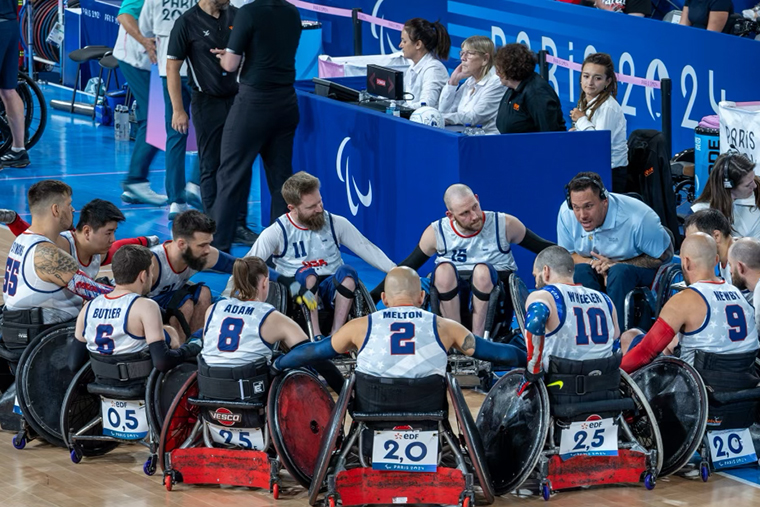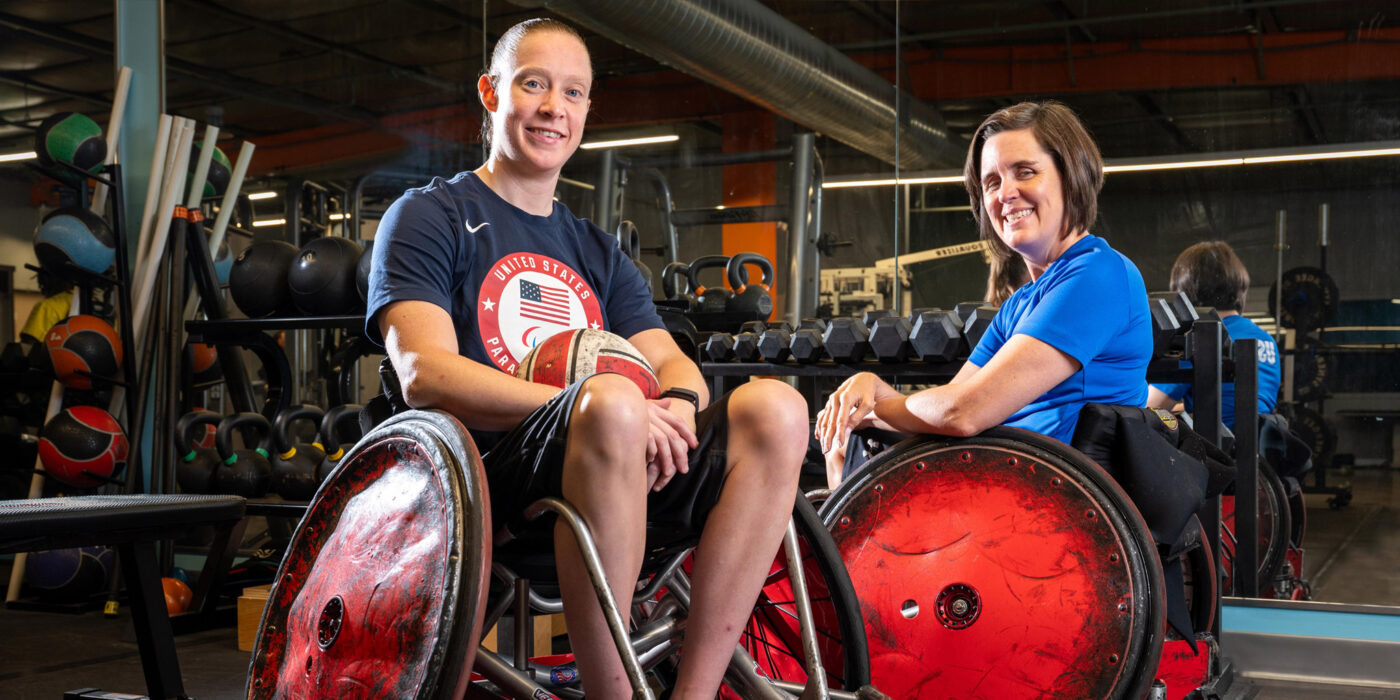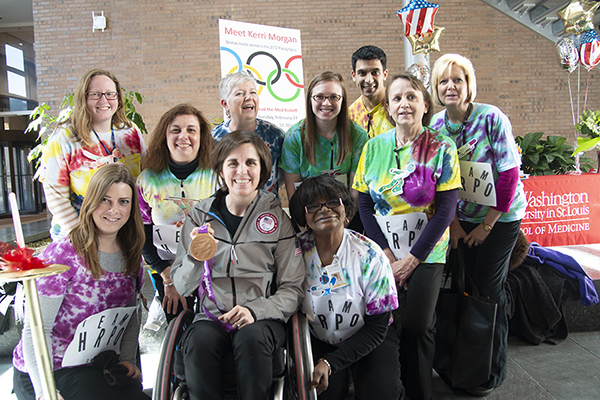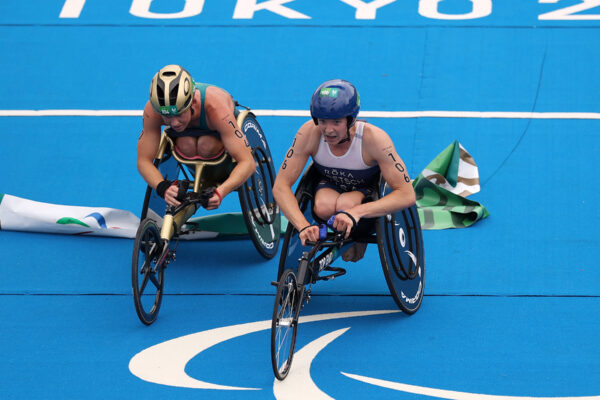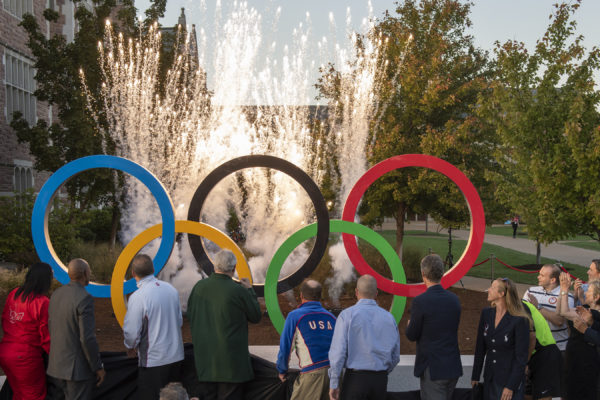Sarah Adam, DOT ’16, had been in pressure situations before. But being the first woman on the USA Paralympic team in wheelchair rugby wasn’t going to be one of them.
“Oddly enough, this was my first competition where I wasn’t really nervous beforehand,” Adam says. “I had total confidence in my teammates and in our preparation. I knew I was going to get some attention for being a female and breaking down barriers, but I had earned this spot and I wanted to do more than just contribute.”
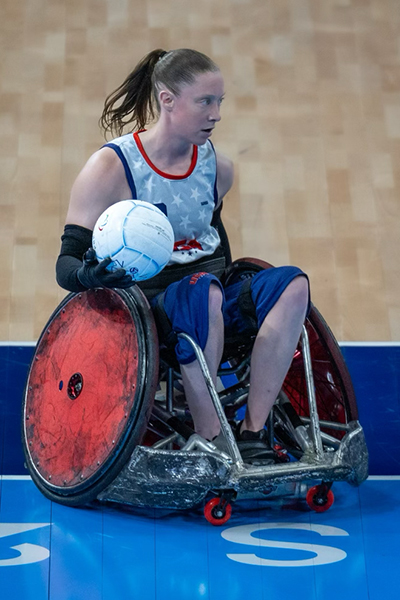
Adam did so much more at the 2024 Paralympic games in Paris. She played in all five matches, scored 55 goals (second most on her team), and helped the United States win the silver medal. In doing so, Adam became the first U.S. woman athlete to win a medal in wheelchair rugby.
Since then, Adam, whose disability comes from multiple sclerosis (MS), has become an ambassador for the sport popularized two decades ago as “Murderball.” She prefers the term “full-speed bumper cars.” Wheelchair rugby is fast, rough-and-tumble and highly competitive, and it’s not uncommon for players to break a finger, dislocate a thumb or suffer a concussion — if and when the wheelchair flips over after a collision. When that happens, Adam follows a tumble with a thumbs-up so her mom, whether she’s watching on TV or from the stands, knows she’s OK. “It’s kind of embarrassing,” she told Julie Foudy, former U.S. women’s soccer standout, on a recent podcast, “but gotta keep Mom happy.”
Appearing on podcasts with iconic athletes, making public appearances and visiting the White House alongside other Olympians and Paralympians are just a few of the post-Paris events Adam has encountered since the games last September – all while continuing to teach and mentor students in her day job as assistant professor of occupational science and occupational therapy at Saint Louis University (SLU). She’s managing that quite nicely, too, while somehow trying to rejuvenate and restore her body as best she can living with a condition that can be draining and unpredictable.
Making connections
Adam arrived at WashU in 2013 from Augustana College in Rock Island, Illinois, applying here because she knew it was one of the best OT schools in the country. “I knew coming in that I wouldn’t just get a degree from WashU,” she says. “I wanted to make connections with people who are passionate. I wanted to surround myself with people who excel at what they do.”
One of the first connections Adams made when she arrived in St. Louis as an able-bodied student was Kerri Morgan, MSOT ’98, PhD ’15, associate professor of occupational therapy and neurology at WashU Medicine. Morgan was already an accomplished wheelchair athlete, having competed in wheelchair rugby on the national team before switching to the track and field team. At the time, she had earned medals in two Paralympic games, Beijing in 2008 and London in 2012, and a third Paralympics, Rio, was ahead of her. “I remember being a student and being like, ‘Oh my God, Kerri Morgan is the coolest freaking person ever!’” Adam told Foudy on the podcast.
Adam arrived thinking she might want to devote her career to pediatric occupational therapy, so the former college softball player and lifelong athlete began looking for ways to enhance her skills in coaching and teaching. Morgan got Adam connected with the Disabled Athletes Sports Association (DASA) of St. Louis, where she volunteered on weekends and after classes, sometimes as a referee for wheelchair rugby games or even, at times, participating as an able-bodied athlete if a team needed someone to fill out a squad.
“I didn’t know this giant world of adaptive sports existed,” Adam says. “I didn’t come here looking for it, but I immediately fell in love with it. A lot of people are like me and accidentally fall into adaptive sports. But now, we want intentionality. We want it to find more people and let them know it exists.”
Meeting Morgan and getting involved at DASA were moves for Adam that would prove both prescient and profound. “Kerri opened up the door to this whole world for me that is so important to who I am today,” she says.
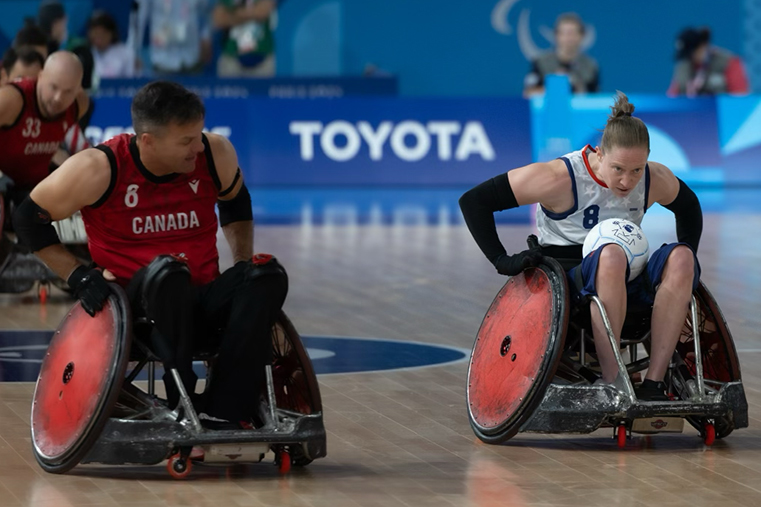
Full circle
Adam was nearing the end of her first year in the OT program when she began having issues with her hand and other neurological symptoms that she was reading about in textbooks. She wanted to dismiss them, but the symptoms would not go away. She underwent months of testing, and shortly before graduation, she got the call confirming a diagnosis of MS. “At first I was in denial,” she says. “I remember thinking, ‘This is going to be my body for the rest of my life,’ but I think I pushed away the fact that the condition was progressive. So I came out of grad school thinking, ‘OK no big deal. Plenty of people with MS are just fine.’”
She worked as a clinical OT for about five years, until the MS had progressed to a point where she could no longer handle the physical demands of dealing with patients on a day-to-day basis. “I’m not one of the lucky ones,” she says. “I’m one that has had several relapses and an obvious change in function. But playing sports my whole life has taught me to have that ‘next play mentality.’ When something happens, turn the page and figure out what’s next.”
In 2021, she began teaching in SLU’s occupational therapy program. “At times I miss being a clinician, but teaching is the next best thing,” she says. “A lot of what we do as occupational therapists is educate patients and caregivers. Now, it’s fun for me to see the students have those ‘aha’ moments when things click, because I remember having those moments myself. This is what I was trained to do. This is what I love.”
“Kerri is somebody who has been such an integral part in what I’ve been able to achieve, from teaching me how to handle work and being a Paralympian, to training, to being the only female on a men’s team. To share that moment with her was important.”
Sarah Adam, on sharing her Paralympic experience with Morgan
That, and wheelchair rugby. Having already volunteered at DASA, the club provided her with a community and a way to stay active in competitive sports. Right about the time she began transitioning to teaching, she made her first Team USA squad and began traveling with the team. SLU supported her in every way, working around her schedule so she could both teach and compete for the national team.
“SLU did a watch party for me when I was in Paris, which is funny because I remember WashU doing the same thing for Kerri Morgan when she was in Rio,” Adam says. “For my students to do that for me was kind of a cool full-circle moment.”
Morgan was the second person Adam called – after her mom – when she got word she had made Team USA’s Paralympic roster. “Kerri is somebody who has been such an integral part in what I’ve been able to achieve,” Adam says, “from teaching me how to handle work and being a Paralympian, to training, to being the only female on a men’s team. To share that moment with her was important.”
For Morgan, who proudly watched stateside and sent encouraging texts while Adam competed in Paris, the feeling is mutual. “What I really value about Sarah is how intentional she is with the relationships she has,” Morgan says. “If I need something, she’s the one I know that I can call, no questions asked. She just knows how to show up and be present.”
Giving herself grace
Adam continues to represent Team USA and hopes to play in the Paralympics in 2028 – especially as the games are in Los Angeles and more of her family and friends will be able to watch in person. But MS can be so unpredictable. “I hope to be there competing,” she says, “but I could relapse at any time.”
Until then, she’ll bear down and continue to train, not knowing on any given day what MS is going to do to her body. It helps knowing there are other athletes who face the same challenges. Through the Paralympic movement, Adam has been able to connect with skier Danelle Umstead. They talk through both the physical and mental aspects of how difficult it is to navigate MS and compete at a high level. “We talk about how we’ll beat ourselves up and forget to give ourselves grace,” Adam says. “We remind each other that there’s this extra factor fighting your ability to live your life, but it’s just one factor.
‘Now, maybe people can understand disability a little bit more, because they have a view of somebody with a disability who is powerful and not limited by their circumstances.’
Sarah Adam
“I know there have been a few times when I’ve thought I should pull back on some of the things I’m doing,” she says, “but what what would I pull back on? I love all of it. I love the teaching. I love speaking, I love traveling, I love rugby. I don’t know where I’d pull back.”
So for as long as she is able, she’ll be an ambassador for her sport and for all athletes with disability.
“We need to make sure people understand there’s a bigger purpose here. It’s not just finding new fans,” she says. “It’s opening up the world of disability. People understand and connect with sports, which is great. Now, maybe people can understand disability a little bit more, because they have a view of somebody with a disability who is powerful and not limited by their circumstances.”
And every once in awhile, she’ll give herself that grace she and Umstead talk about. She’ll feel joy as she remembers some pivotal moments from the Paralympics, like this one: During the semifinal victory over archrival Great Britain, as she was waited for the fourth quarter to begin, she remembers looking at the crowd and thinking about the pregame speech of Team USA Coach Joe Delagrave.
“Coach reminded us about finding your joy,” Adam says. “And so the clock was winding down to start the fourth quarter, and the crowd was singing in French and was super loud and rowdy. I usually tune all that out – I don’t even look for my family during a game. But I allowed myself in that moment to take it in. And I remember thinking, ‘Wow! You’re in the Paralympics in front of a sold-out crowd on international television!’
“And I turned to my coach and said, ‘This is so cool!’”
